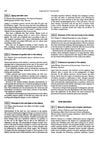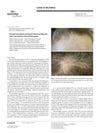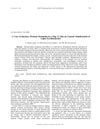 47 citations,
December 2020 in “Journal of the European Academy of Dermatology and Venereology”
47 citations,
December 2020 in “Journal of the European Academy of Dermatology and Venereology” The document concludes that understanding and treating hair loss requires recognizing its various types and using appropriate diagnostic tools and treatments.
 52 citations,
June 1981 in “International Journal of Dermatology”
52 citations,
June 1981 in “International Journal of Dermatology” Oral retinoids are effective for severe skin conditions but require careful use due to side effects.
 3 citations,
July 2018 in “Elsevier eBooks”
3 citations,
July 2018 in “Elsevier eBooks” Erosive pustular dermatosis of the scalp is a rare condition that causes scarring hair loss, mainly in older women, and requires ongoing treatment.

Antimalarial agents are effective for LPP, and intralesional steroids are effective for FFA.
 69 citations,
August 2008 in “Journal of The European Academy of Dermatology and Venereology”
69 citations,
August 2008 in “Journal of The European Academy of Dermatology and Venereology” Oral dutasteride and topical pimecrolimus can safely and effectively treat Frontal Fibrosing Alopecia, leading to significant hair regrowth.
10 citations,
November 2017 in “Skin Appendage Disorders” Erosive pustular dermatosis in elderly people may be linked to aging immune systems and skin damage.
 September 1998 in “Journal of The European Academy of Dermatology and Venereology”
September 1998 in “Journal of The European Academy of Dermatology and Venereology” Old people's nails often have problems due to body changes, more diseases, and self-care difficulties, affecting their movement and hand use.
 22 citations,
January 2017 in “Skin appendage disorders”
22 citations,
January 2017 in “Skin appendage disorders” The conclusion is that primary scarring alopecia is a complex condition that requires early and accurate diagnosis for effective treatment.
 April 2019 in “Journal of the Dermatology Nurses’ Association”
April 2019 in “Journal of the Dermatology Nurses’ Association” A 37-year-old man with hair loss and skin issues was successfully treated with oral antibiotics, highlighting the need for early treatment. Long-term care includes low-dose antibiotics and avoiding caps and wigs.
 September 1998 in “Journal of The European Academy of Dermatology and Venereology”
September 1998 in “Journal of The European Academy of Dermatology and Venereology” Aging can lead to poorer scalp and hair health, including less hair and more scalp diseases, which should be managed to help older people feel better.
 September 1998 in “Journal of The European Academy of Dermatology and Venereology”
September 1998 in “Journal of The European Academy of Dermatology and Venereology” Skin fungal infections are more common in older adults due to factors like obesity, poor circulation, reduced mobility, and weakened immune defenses from certain medications.
 27 citations,
September 2018 in “Skin appendage disorders”
27 citations,
September 2018 in “Skin appendage disorders” Hair transplantation may work for some types of scarring alopecia, but results vary and more research is needed.
 22 citations,
October 2020 in “Anais Brasileiros de Dermatologia”
22 citations,
October 2020 in “Anais Brasileiros de Dermatologia” The Brazilian Society of Dermatology agrees that oral isotretinoin is effective for acne and other skin conditions, and it's safe when monitored, but more research is needed on dosing and duration.
 179 citations,
October 2018 in “American Journal of Clinical Dermatology”
179 citations,
October 2018 in “American Journal of Clinical Dermatology” Cancer treatments targeting specific cells and the immune system can cause skin, mouth, hair, and nail problems, affecting patients' quality of life and treatment adherence.
 23 citations,
April 2018 in “Journal der Deutschen Dermatologischen Gesellschaft”
23 citations,
April 2018 in “Journal der Deutschen Dermatologischen Gesellschaft” Permanent hair loss from cicatricial alopecia is treated by reducing inflammation and managing symptoms, but regrowth in scarred areas is unlikely.
 13 citations,
April 2022 in “Anais brasileiros de dermatologia/Anais Brasileiros de Dermatologia”
13 citations,
April 2022 in “Anais brasileiros de dermatologia/Anais Brasileiros de Dermatologia” The document concludes that more research is needed to find effective treatments for Lichen planopilaris and Frontal fibrosing alopecia.

research Skin
2 citations,
January 2011 in “Elsevier eBooks” Skin problems are common in Lupus patients and can indicate the disease's severity, requiring specific treatments and lifestyle changes.
 22 citations,
January 2018 in “Experimental Dermatology”
22 citations,
January 2018 in “Experimental Dermatology” The meeting focused on understanding, diagnosing, and finding treatments for irreversible hair loss diseases.
 13 citations,
September 2017 in “Skin appendage disorders”
13 citations,
September 2017 in “Skin appendage disorders” Some women with Frontal Fibrosing Alopecia also have Lichen Planopilaris, which can lead to more symptoms and affect hair outside the scalp.
 44 citations,
November 1998 in “Australasian Journal of Dermatology”
44 citations,
November 1998 in “Australasian Journal of Dermatology” Accurate diagnosis is key for treating different kinds of hair loss, and immune response variations may affect the condition and treatment results.
 January 2010 in “Elsevier eBooks”
January 2010 in “Elsevier eBooks” The document concludes that different types of hair loss have specific treatments, and early diagnosis is crucial for preventing permanent hair loss.
 44 citations,
April 2012 in “American Journal of Clinical Dermatology”
44 citations,
April 2012 in “American Journal of Clinical Dermatology” Scarring alopecias are complex hair loss disorders that require early treatment to prevent permanent hair loss.
 2 citations,
January 2014 in “Journal of clinical and investigative dermatology”
2 citations,
January 2014 in “Journal of clinical and investigative dermatology” Some drugs used to treat immune conditions may cause different types of hair loss.
 9 citations,
September 2006 in “Veterinary pathology”
9 citations,
September 2006 in “Veterinary pathology” A dog with unusual skin lesions near its tail was successfully treated for a rare form of lupus.
 132 citations,
July 2000 in “Lupus”
132 citations,
July 2000 in “Lupus” In Italian patients with lupus, the most common skin issue was chronic cutaneous lupus, especially discoid lesions, and nonspecific skin problems occurred in about a third of those with systemic lupus, mainly during active disease.
 November 2022 in “JAAD case reports”
November 2022 in “JAAD case reports” A man with skin and hair symptoms improved partially with specific treatment.
 5 citations,
February 2015 in “New England journal of medicine/The New England journal of medicine”
5 citations,
February 2015 in “New England journal of medicine/The New England journal of medicine” The conclusion of the case is not provided in the summary.
 4 citations,
March 2006 in “Archives of Dermatology”
4 citations,
March 2006 in “Archives of Dermatology” The conclusion is that dermatologists can improve women's skin health but must overcome cultural and economic barriers to do so.
 22 citations,
September 2004 in “Journal of The European Academy of Dermatology and Venereology”
22 citations,
September 2004 in “Journal of The European Academy of Dermatology and Venereology” Bimatoprost can cause longer, thicker, darker eyelashes and eyebrows.
 11 citations,
September 2021 in “Anais Brasileiros de Dermatologia”
11 citations,
September 2021 in “Anais Brasileiros de Dermatologia” The conclusion is that early diagnosis of skin signs linked to diseases like Lupus, Dermatomyositis, and Rheumatoid Arthritis is crucial to prevent serious complications.





























